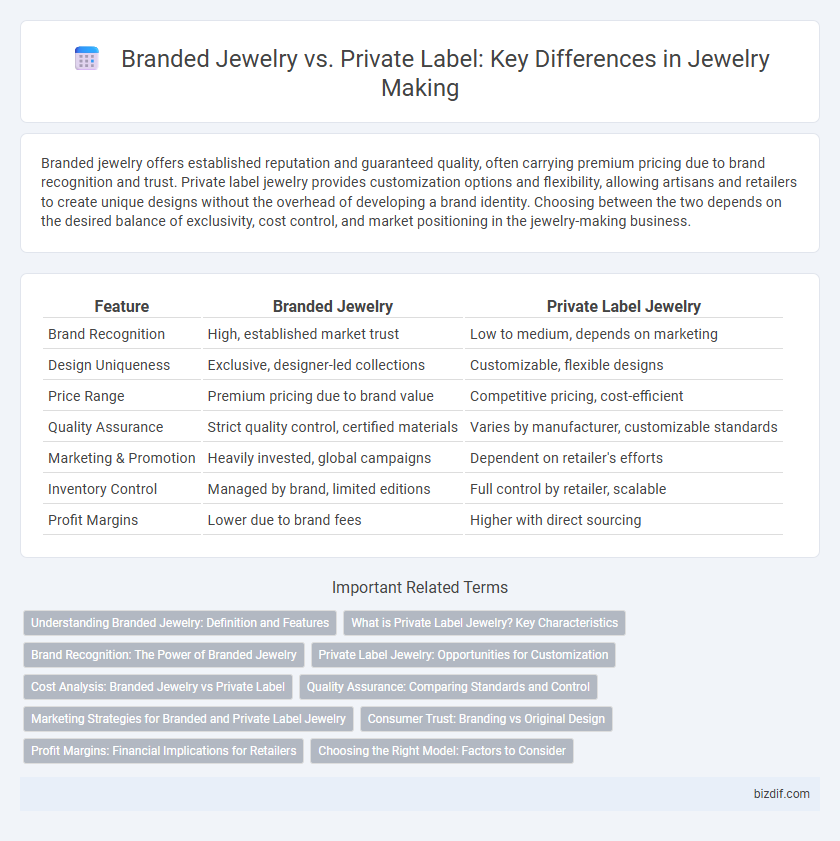Branded jewelry offers established reputation and guaranteed quality, often carrying premium pricing due to brand recognition and trust. Private label jewelry provides customization options and flexibility, allowing artisans and retailers to create unique designs without the overhead of developing a brand identity. Choosing between the two depends on the desired balance of exclusivity, cost control, and market positioning in the jewelry-making business.
Table of Comparison
| Feature | Branded Jewelry | Private Label Jewelry |
|---|---|---|
| Brand Recognition | High, established market trust | Low to medium, depends on marketing |
| Design Uniqueness | Exclusive, designer-led collections | Customizable, flexible designs |
| Price Range | Premium pricing due to brand value | Competitive pricing, cost-efficient |
| Quality Assurance | Strict quality control, certified materials | Varies by manufacturer, customizable standards |
| Marketing & Promotion | Heavily invested, global campaigns | Dependent on retailer's efforts |
| Inventory Control | Managed by brand, limited editions | Full control by retailer, scalable |
| Profit Margins | Lower due to brand fees | Higher with direct sourcing |
Understanding Branded Jewelry: Definition and Features
Branded jewelry refers to pieces created and marketed under a recognized brand name, often characterized by consistent design aesthetics, high-quality materials, and trademarked logos that ensure authenticity. These products usually come with warranties and official certificates of origin, reflecting the brand's reputation and craftsmanship standards. Consumers often choose branded jewelry for its guaranteed quality, resale value, and association with luxury or designer status.
What is Private Label Jewelry? Key Characteristics
Private label jewelry refers to pieces designed and manufactured by one company but sold under another brand's name, allowing retailers to customize designs without investing in production. Key characteristics include exclusive branding, flexibility in design choices, and cost-effective inventory management. This model offers retailers the advantage of unique product lines that strengthen brand identity while maintaining competitive pricing.
Brand Recognition: The Power of Branded Jewelry
Branded jewelry leverages established brand recognition to command higher trust and perceived value among consumers, often resulting in premium pricing and increased demand. Private label jewelry, while customizable and cost-effective, typically lacks the immediate market credibility that branded pieces enjoy. Strong brand recognition in the jewelry industry drives customer loyalty and enhances resale value, making branded jewelry a powerful asset for both retailers and buyers.
Private Label Jewelry: Opportunities for Customization
Private label jewelry offers extensive opportunities for customization, allowing designers to create unique pieces that reflect specific brand identities and customer preferences. By leveraging private label manufacturing, businesses can control materials, styles, and quality to meet niche market demands and enhance product differentiation. This approach enables rapid adaptation to trends and fosters strong brand loyalty through personalized, exclusive collections.
Cost Analysis: Branded Jewelry vs Private Label
Branded jewelry typically incurs higher costs due to marketing expenses, established brand premiums, and extensive distribution channels, resulting in increased retail prices. Private label jewelry offers cost advantages by eliminating brand-related marketing and leveraging direct manufacturing, allowing for greater pricing flexibility and higher profit margins. Comparing production expenses, private label enables more control over materials and design costs, making it a cost-effective option for retailers seeking customized inventory.
Quality Assurance: Comparing Standards and Control
Branded jewelry typically undergoes rigorous quality assurance processes with standardized testing and certifications ensuring consistent craftsmanship and material integrity. Private label jewelry quality varies widely based on the manufacturer's protocols, often requiring buyers to enforce strict inspections and audits to maintain acceptable standards. Comparing control mechanisms reveals branded pieces benefit from established reputations backed by warranty policies, whereas private label options rely more heavily on individual partnerships and quality agreements.
Marketing Strategies for Branded and Private Label Jewelry
Marketing strategies for branded jewelry emphasize building strong brand identity and leveraging consumer trust through consistent quality, storytelling, and emotional appeal. Private label jewelry relies on targeted niche marketing, flexible customization options, and competitive pricing to attract retailers and end consumers seeking unique designs. Digital marketing, influencer partnerships, and social media campaigns play crucial roles in both approaches to increase visibility and drive sales.
Consumer Trust: Branding vs Original Design
Branded jewelry benefits from established consumer trust through recognized logos, consistent quality, and proven reputation, which often justifies higher price points. Private label jewelry emphasizes original design and customization, appealing to consumers seeking unique, personalized pieces but may require stronger marketing to build brand credibility. Both approaches influence purchasing decisions, balancing brand familiarity with the desire for exclusive craftsmanship.
Profit Margins: Financial Implications for Retailers
Branded jewelry typically offers higher profit margins due to established brand recognition and customer trust, leading to premium pricing and increased sales volume. Private label jewelry allows retailers to control production costs and pricing strategies, often resulting in better margins but requires significant investment in marketing and brand development. Retailers must weigh the upfront costs of private label creation against the consistent revenue and brand loyalty associated with established branded jewelry.
Choosing the Right Model: Factors to Consider
When selecting between branded jewelry and private label, consider factors such as brand recognition, customization options, and target market preferences. Branded jewelry offers established credibility and marketing support, while private label allows for greater design control and unique product offerings. Evaluating production costs, profit margins, and long-term scalability is crucial for aligning with your business goals.
Branded jewelry vs Private label Infographic

 bizdif.com
bizdif.com